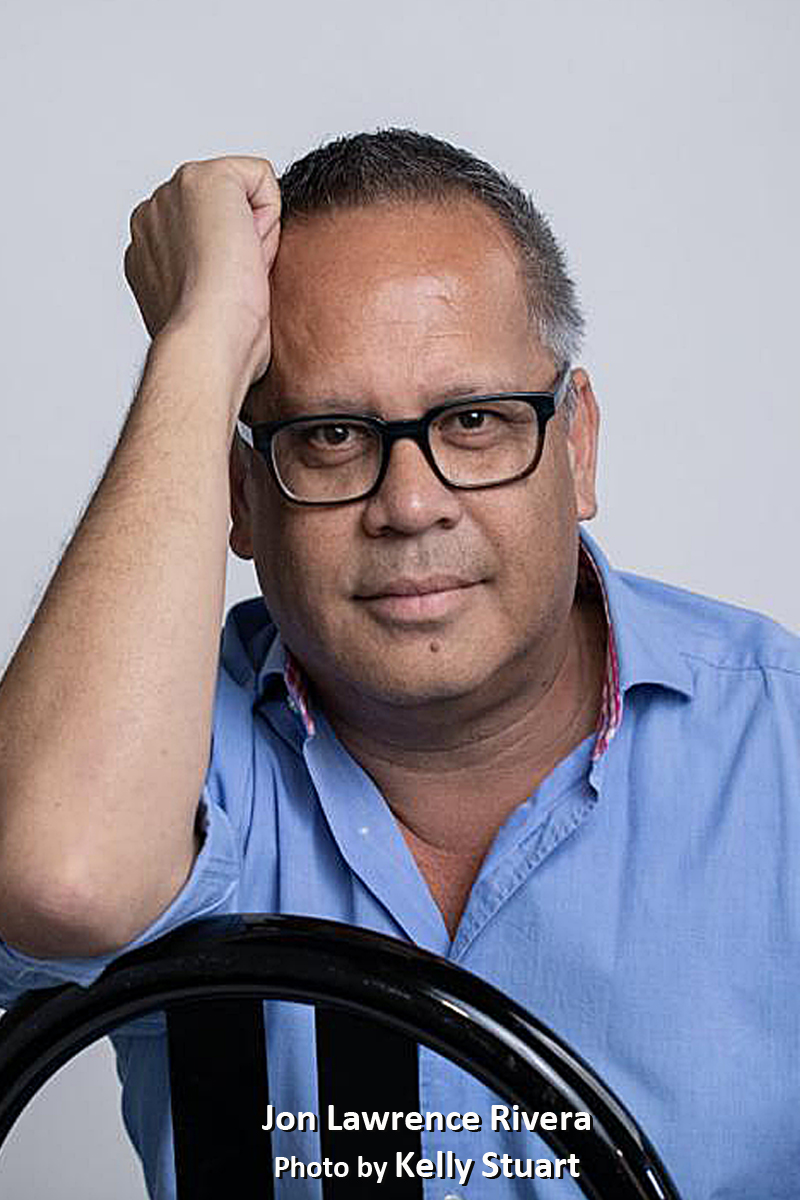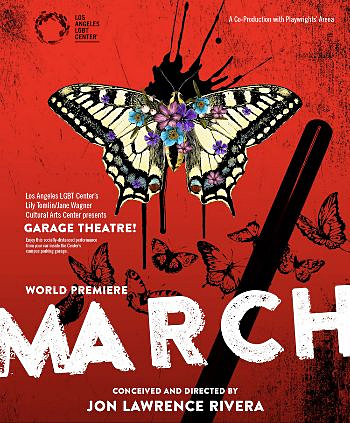Interview: Prolific Director Jon Lawrence Rivera MARCHes Thru The Pandemic With The LALGBT Center
Jon Lawrence Rivera worlds premiere MARCH, inaugurating the Los Angeles LBGT Center’s innovative new live theatre series, GARAGE THEATRE on Oct. 17.

Playrights' Arena's artistic director Jon Lawrence Rivera will world premiere MARCH, inaugurating the Los Angeles LBGT Center's innovative new live theatre series, GARAGE THEATRE on Saturday, October 17, 2020. Performances for audiences (in their individual vehicles) will take place in the unique, experimental space of an underground parking structure located below the Center's Anita May Rosenstein Campus in Hollywood. Performances at 7:30pm and 9pm every Saturday and Sunday through November 15 feature Miss Barbie Q (MJ), Chad Christopher, Matthew Clark, Amir Levi, Marcelino Mendoza, Coretta Monk, and Roland Ruiz.
Jon took a few moments to answer my queries before his first live in-person rehearsal.
Thank you for taking the time for being interviewed by me once again, Jon.
How are you holding up creatively in these no-live-theatre times?
It's been tough. But I have been managing and keeping busy trying to use the time to get caught up on many script submissions we have by doing Zoom readings for development purposes. They have proven to be really valuable. Also, I keep thinking of what we can do while our theaters are shuttered. This is why I conceived this garage/parking lot play.
What initially led you to connect with the Center's Jon Imparato and Matt Richter for MARCH?
A few months ago, when it was announced that Broadway will not reopen until next year, I started to have anxiety. I just couldn't see myself being fulfilled by doing Zoom presentations for another six months or more. So I started dreaming of doing plays in a parking lot where the audience remains safely quarantined in their cars watching a play. I was investigating some parking lots and posted about my search on social media. Matt Richter from the Center texted me right away (while I was doing my site visit) and said, "We have the parking lot, we have the technology for the sound, let's do it here." Within two minutes of that text, Jon Imparato sents me a text: "Let's talk. Are you free tomorrow?"
That was it. I met with Jon and Matt the following day. I had already conceived a play in my head about trans oppression that would fit with the Center's mission. We walked through their underground garage where the performance would take place. I told Jon that I would send him in writing the concept for the play, the details, possible budget, logistics, etc.
Two days later, I sent Jon the concept (which will be devised and written by the acting company and myself), the proposed budget, and timeline. He got back to me right away and said, "I love it. Let's make it happen."
Are you first rehearsing and prepping with everyone via Zoom?
We just finished two weeks of Zoom rehearsals as the acting company were doing writing exercises through a series of prompts I've given them. After each rehearsal, the company would send me their writing and I would distill their words into the play. I've done this process on a few other projects. It's nerve-racking as I am hoping I get enough material to create a play with complexity, conflict, and real drama. Fortunately, I have been gifted an astonishing cast that gave me so much juicy material to work with. The final written script is really written by the company with my help and the help of our dramaturg, Nick Salamone.
When do you physically gather to rehearse in the garage of the Center's Anita May Rosenstein Campus?
We start tonight (September 30). It's very exciting to finally see everyone in person after spending time with the cast only through my computer screen.
What safety measures have been implemented for your cast and crew to be together?
First of all, this couldn't have happened without the LGBT Center. They are already CDC compliant. So we are following all the CDC rules: temperature checks before coming in to the Center, and everyone will have to wear face masks and be six feet or more distanced from each other. We also have a certified COVID specialist in the cast who monitors all our actions. Stage management is marking the rehearsal room and the garage with six feet markers so the actors are always distanced. In addition to the face masks, the actors are wearing face shields as part of their costumes. There will be sanitizers everywhere. We are very serious about making sure the actors and the entire company are protected.
Will you have understudies for all the roles? Or are you having your cast learn multiple roles to cover if necessary?
We are getting a swing for the soldiers, and one of the actors is covering one of the principals. The rest, we are crossing fingers can do all the shows without any challenges.
The recent livestreamed production of ROMANTICS ANONYMOUS from the Bristol Old Vic featured dancing, singing and even kissing, (this after the entire group quarantined together for weeks before their live production). Does your blocking of MARCH include any physical contact between actors?
By design, there is no physical contact involved in our production. I've created a "no touch" language in the play. Some of the characters carry six foot sticks that they use throughout the play. This ensures that there is always six feet distance between actors.
What obstacles in mounting MARCH in this new drive-in mode have you already experienced before in one form or another, and overcome, in your 36 years of producing, directing, and creating theatre?
So far, we haven't found any physical challenges. But we are only going to in-person rehearsals tonight. The biggest challenge Jon Imparato and I have had so far is casting the play. Actors are still getting work, thankfully, so we keep re-casting several roles because actors get jobs and have to leave. This was true before COVID. But with the pandemic, we totally understand the financial burden on everyone. So if a job is available elsewhere and they have to pull away, we support their choice.
Did you hold auditions via Zoom? Or did you cast from your Playwrights' Arena pool of actors?
With help of casting consultant Raul Staggs, we asked actors to submit audition tapes. Imparato and I looked through them and discussed at length each actor's submission. Then we cast them for the play from those submissions.
What would your three-line pitch of MARCH be?
MARCH, set in 2045 (eerily resembling today), deals with trans and non-binary oppression from the most unlikely group of soldiers. It's a play about resilience and power when all is almost lost, including your identity.
Will MARCH be site-specific to the garage of the Center's Anita May Rosenstein Campus, just as you staged THE HOTEL PLAY in an actual hotel, instead of a theatre?
Yes. It is designed to be site-specific. Not only are we using the garage, but we are not ignoring the people in the cars who are watching the play. It's not interactive, but we are not ignoring the fact that there are people in cars watching.
As the artistic director of Playwrights' Arena, do you shoulder all the responsibilities of keeping the group creating? Or have you been able to share and divvy up that heavy load?
I have been carrying most of the responsibilities to push forward and strengthen our vision as we emerge from this pandemic. But I have a great deal of support from our Literary Department (Jersey Bates and Zharia O'Neal) who are constantly identifying L.A.-based playwrights to consider for our seasons.
 Have you re-imagined any of the plays you've already done to be viewed in the new normal medium of Zoom?
Have you re-imagined any of the plays you've already done to be viewed in the new normal medium of Zoom?
Not really. I personally do not like Zoom anything. I know it works great for many other theatres and I am delighted for them. As a tool for developing plays, yes!
Do you plan to create any new work specific to Zooming?
No immediate plans.
Would you leave us with a few optimistic views on the future of live theatre, particularly in Los Angeles?
I believe we will re-emerge with more commitment to diverse plays giving platforms to multicultural stories that have usually been ignored. My hope is not just for the first year after we emerge from this pandemic, but how we, as a community, will be able to sustain a desire to lift up BIPOC stories and artists for forever. The culture has shifted. Do we focus on that, or do we revert back to the old ways?
Thank you again, Jon. I look forward to experiencing your MARCH at the drive-in.
To read my interview with Jon from last year, click here.
Tickets for the weekend performances through November 15, 2020 are $20 per car and may be purchased online at www.lalgbtcenter.org/theatre
Comments
Videos

